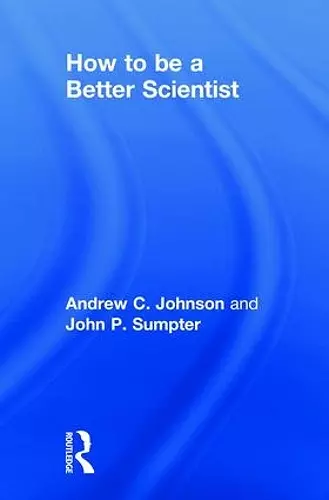How to be a Better Scientist
Andrew Johnson author John Sumpter author
Format:Hardback
Publisher:Taylor & Francis Ltd
Published:4th Dec '18
Currently unavailable, and unfortunately no date known when it will be back
This hardback is available in another edition too:
- Paperback£22.99(9781138731295)

Understanding the fundamentals of conducting good science, that will have an impact, is the goal of every aspiring scientist. Providing a wealth of tips, How to be a Better Scientist is the book to read if you want to succeed in this competitive field.
Helping readers gain an insight into what good science means and how to conduct it, this book is ideal to read cover-to-cover or dip into. It includes easily accessible guidance on topics such as:
• What characteristics should a scientist have?
• Understanding the hypothesis
• Integrity in science
• Lack of confidence and the embarrassment factor
• Time management
• Coping with rejection
• Interacting with the science community
With its broad focus, this friendly guide will enthuse, inspire and challenge, and is an essential companion for all aspiring scientists.
Chock-full of helpful advice and written by two highly experienced scientists in an engaging and amusing style, this book will be a boon to all early career researchers, whether just starting a PhD or building a first research group.
Essential advice and good sense for early career and indeed late career scientists.
Sir Charles Godfray FRS, Director, Oxford Martin School, Oxford University
I found the advice in ‘How to be a Better Scientist’ very insightful and honest. I wish this book had existed (and that I had read it) long before now! It really will be so helpful, comforting and enlightening for early career scientists like me.
Steph Chaousis, Final year Ph.D. student, Griffith University, Australia
Science has never been more important to society than it is at present and I am confident it will be even more important in future. It is essential that scientists are trusted and that their work has integrity. There are many ways scientists can become good at their art but this is largely defined by the personalised journey travelled by each through their career. For many of us it is a wonderful learning experience but we all need guidance about how to navigate its methodological, social and cultural intricacies. Leaving this to instinct, or the hard lessons learned from trial and error, is wasteful. In the past, the guidance of strong mentors and role models was what we sought but more is needed. This timely and welcome book, written by hardened and successful professionals in the art, will help the budding generation of scientists to be better than the last.
Ian Boyd, Chief Scientist of Defra
Chock-full of helpful advice and written by two highly experienced scientists in an engaging and amusing style, this book will be a boon to all early career researchers, whether just starting a PhD or building a first research group.
Essential advice and good sense for early career and indeed late career scientists.
Sir Charles Godfray FRS, Director, Oxford Martin School, Oxford University
I found the advice in ‘How to be a Better Scientist’ very insightful and honest. I wish this book had existed (and that I had read it) long before now! It really will be so helpful, comforting and enlightening for early career scientists like me.
Steph Chaousis, final year Ph.D. student, Griffith University, Australia
Science has never been more important to society than it is at present and I am confident it will be even more important in future. It is essential that scientists are trusted and that their work has integrity. There are many ways scientists can become good at their art but this is largely defined by the personalised journey travelled by each through their career. For many of us it is a wonderful learning experience but we all need guidance about how to navigate its methodological, social and cultural intricacies. Leaving this to instinct, or the hard lessons learned from trial and error, is wasteful. In the past, the guidance of strong mentors and role models was what we sought but more is needed. This timely and welcome book, written by hardened and successful professionals in the art, will help the budding generation of scientists to be better than the last.
Ian Boyd, Chief Scientist at the Department for the Environment, Food and Rural Affairs, UK
ISBN: 9781138731219
Dimensions: unknown
Weight: 340g
260 pages